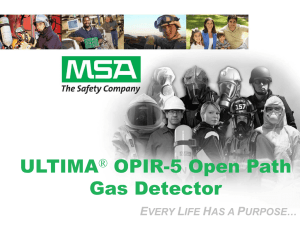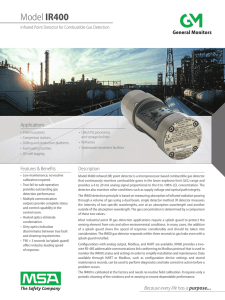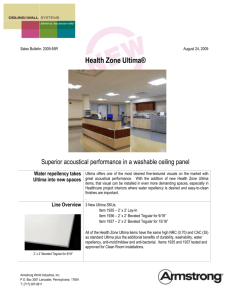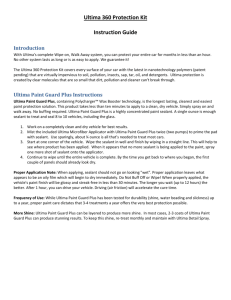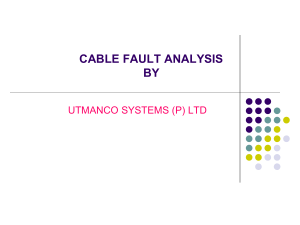IR5500 Open Path Detector
advertisement
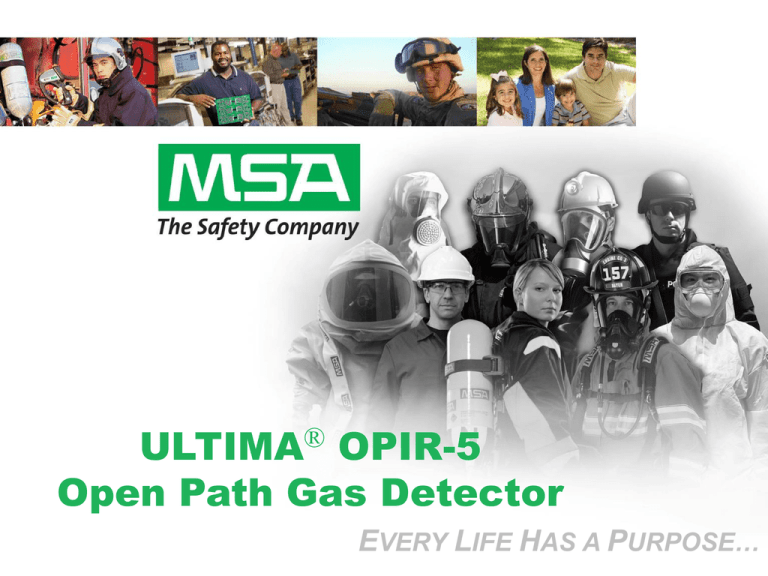
ULTIMA® OPIR-5 Open Path Gas Detector EVERY LIFE HAS A PURPOSE… Contents 1. 2. 3. 4. 5. 6. 7. 8. 9. 10. 11. Product Overview False Alarm Immunity Detector Placement Installation Split Concentration Range Maintenance Fault Conditions HART AMS Device Manager Applications Summary ULTIMA OPIR-5 Detector Description – Open path infrared hydrocarbon gas monitoring system Expected Customer Benefits – Low power consumption – Dual analog outputs, ppm•M and LEL•M – Light and compact design – Resilient to solar radiation and fog – Long detection range – Available with HART and Modbus – Stainless steel construction – Integral display Performance Specifications Specifications Ultima OPIR-5 Response time (T90, s) <5 Repeatability < 5% Linearity 5% FS or 10% Path length, max (m) 150 Operating temperature range (C) -55 to +65 Solar blind All conditions Fog immunity 90% blockage, 10% acc. Combined weight, receiver and source (kg) 11.13 (SS only) Supply power, nominal (W) 23 Bidirectional communication HART, Modbus Event logging and AMS Device Manager Available Solar Radiation Rejection The ULTIMA OPIR-5 has superior immunity to solar radiation and other external IR radiation sources. Performance Certifications The ULTIMA OPIR-5 is the world’s first and only open path detector to meet agency performance requirements on both LEL•m and ppm•m scales Detector Placement Open path detectors should be installed based on several considerations: – Hazard conditions within the installation area covered – Ventilation rates, direction, and presence of recirculation and dead zones – Sensitivity to low (geometric) sunlight, fog, and reflections – Powerful sources of electromagnetic emissions like high powered electrical towers – Structures that may interfere with line of sight * Health and Safety Executive, Offshore Division,” Fire and Explosion Strategy, Issue 1,” 2004. Installation When installing an ULTIMA OPIR-5 detector, it is useful to consider the following: – – – – – – – – Vibration can create issues Solid foundation improves alignment integrity The longer the line of sight path, the more solid the foundation required Maintain a 6” to 12” radius around the line of site beam to avoid reflective interference from piping and supports For outdoor installations, consider maximum snow levels Good immunity to fog, steam, and rain but immunity degrades over longer distances Avoid pedestrian traffic or overhead cranes Keep beam low and down wind for heavy gases like propane and high for light gases like methane Wiring 2 Ultima OPIR-5 Receiver 1 16 COM 3 15 RST 4 14 COM 5 13 0– 20 mA P 6 12 COM 7 11 0– 20 mA L +24V 8 10 COM 9 MOD1- Modbus 1- Modbus 2- MOD2 - 17 MOD1 + Modbus1+ Modbus 2+ MOD2 + 18 A2 Alarm NO/NC Fault NO FLT1 AC Alarm C Fault C FLTC A1 Alarm NC/NO Fault NC FLT2 W2 L Warn NO/NC Warn NC/NO W2 P WC L Warn C Warn C WC P W1 L Warn NC/NO Warn NC/NO W1 P 19 20 21 22 23 24 Split Concentration Range With the split range function, users can monitor the entire span of gas concentration with a single analog signal – Reduces wiring and commissioning costs 5 LEL•m Methane Gas Concentration (LEL•m) Methane Gas Concentration (ppm-m) 5,000 ppm-m (0.1 LEL•m) 0 4 12 AO (mA) 20 Alignment Simple alignment process – Arm or base mounts available Display – Menus activated by magnet – Enables easy alignment, setup & diagnostics Maintenance As with other combustible sensors, the ULTIMA OPIR-5 should be included in the plant maintenance schedule* – Gas check frequency depends on operating conditions (ex. dusty, corrosive, or damp environment) – Before repair or maintenance, the gas detector should be removed to a safe place outside the area being protected If the hazard is still potentially present, it will be necessary to use a replacement gas detector in the area until the original detector is reinstated * BS EN 50073:1999 “Guide for the selection, installation, use and maintenance of apparatus for the detection and measurement of combustible gases or oxygen.” Diagnostics The ULTIMA OPIR-5 has self-diagnostics that inform users when certain types of device failures have occurred Fault Code Description F0 Excessive negative drift or high IR F1 Partial beam block or dirty lens F2 Alignment F3 Beam block F5 Setup menu not exited F6 Low supply voltage F7 Heater error F8 Failed zeroing F9 Gas left (timeout) F10 Reset short F11 Unit overheating tF7 Source internal error HART The ULTIMA OPIR-5 is available with HART for better efficiency with remote communication – Only the primary scale, LEL•m or split range, connects through HART Benefits of the HART-equipped ULTIMA OPIR-5: – Better diagnostics – Improved management of maintenance history and event logging – Flexible and accurate digital transmission – Effective cost control of devices in the field – Installation savings due to fewer wires HART –Analog Signal for Faults Because HART requires a minimum current for operation, the ULTIMA OPIR-5’s fault conditions use 3.5 mA as minimum analog output Function Current Level (mA) Analog Output (Standard) Modbus HART (Default) HART-modified Analog Output Fault 0 0 3.5 1.25 Test Gas 1.5 1.5 3.5 1.5 Setup Mode 1.5 1.5 3.5 1.5 Beam Block 2.0 2.0 3.5 2.0 Startup 0 0 3.5 1.25 Zero Reading 4.04 4.04 4.04 4.04 Gas Concentration 4 – 20 4 – 20 4 – 20 4 – 20 Over-range 21.7 21.7 21.7 21.7 On HART-equipped unit, user must select the HART-modified AO in order use AO values below 3.5 mA AMS Device Manager Asset management and process improvement – Check compliance to calibration schedule – Coordinate calibrations so as to reduce labor cost – Aggregate calibration to a control room – Track gas level remotely – Read fault conditions from control room; before sending technician to the field Ultima OPIR-5 Summary Ultima OPIR-5 Open Path IR Detector – Detects ppm•Meter & LEL•Meter – Path Length up to 150 M – Wide Temperature range – Global Approvals – Integral Display - Easy alignment, diagnostics and maintenance
